Physician Salary Report 2025: Modest increase in physician compensation
September 02, 2025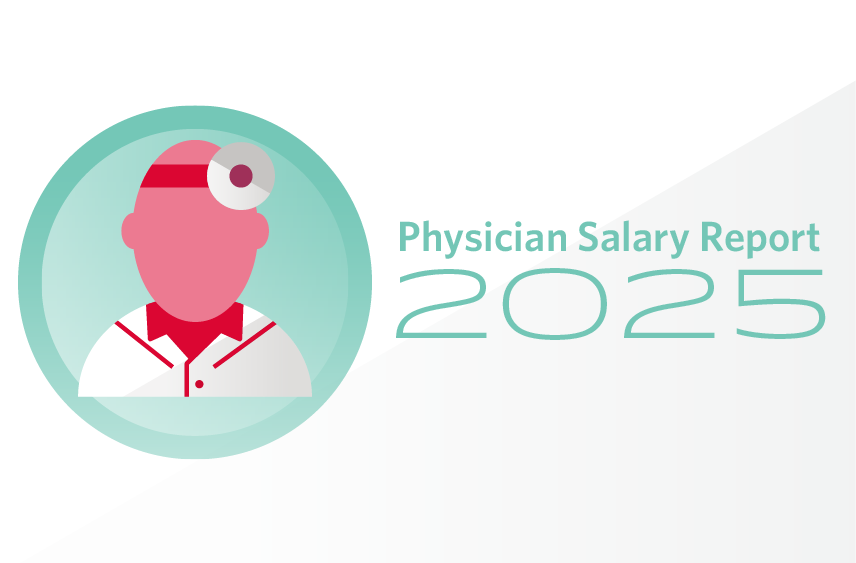
Physician salaries in the U.S. continued their upward climb in 2024, but the pace has now slowed—and many doctors feel the increases haven’t kept up with rising costs or the demands of the profession. According to Medscape’s 2025 Physician Compensation Report, the average physician took home $374,000 last year. That’s up from $363,000 in 2023 and $352,000 in 2022.
While the trend line is moving in the right direction, it hasn’t translated into satisfaction. More physicians report feeling underpaid, and nearly four in 10 now supplement their income with side gigs.
Modest gains in income, rising frustration with compensation, and a growing interest in locum tenens were all noted in this year’s report. Let’s take a closer look at the latest physician compensation trends and what they mean for doctors in 2025.
Physician salary growth has slowed
Physician income trends are ticking upward, albeit slowly. The data show incremental and steady gains, but inflation and increasing administrative burdens have left many physicians feeling the pressure.
In 2024, physicians earned an average of $374,000, a 2.9% increase over the previous year. Primary care physicians (PCPs) earned $287,000, up slightly from $277,000 in 2023 and $265,000 in 2022. Specialists, meanwhile, averaged $404,000, compared to $394,000 in 2023 and $382,000 in 2022.
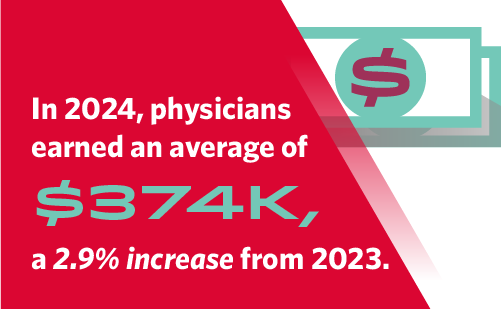
That’s an increase of about $22,000 in two years. But rising operating costs, staffing shortages, and price inflation have dulled the impact for many.
Top-earning specialties remain constant
Some specialties continue to stand well above the rest in terms of annual income. Medscape’s 2025 report found the top three highest-paid physician specialties to be:
Orthopedics and orthopedic Surgery: $564,000
Plastic surgery: $544,000
Radiology: $526,000
Top 5 highest-paid physician specialties in 2025
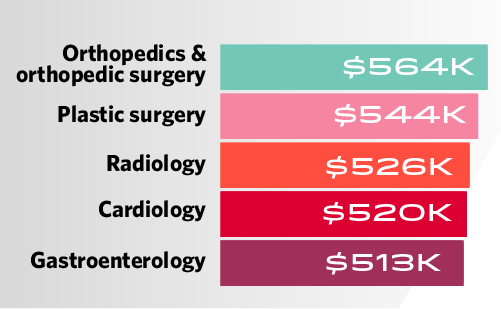
These specialties often combine high procedure volume, long training paths, and complex care, all of which contribute to higher compensation. While orthopedics and plastic surgery have alternated taking the top spot the past two years, radiology jumped to third place this year from sixth in last year’s report.
Further, demand for physicians in procedural, surgical, and diagnostic fields is still high. Specialists in cardiology, gastroenterology, and urology followed close behind in earnings.
Physicians continue to work long hours
Workloads held steady in 2024, with most physicians reporting similar hours and patient volumes as previous years.
The average physician works about 50 hours per week, a figure that has remained largely unchanged for the past seven years. Primary care doctors, on the other hand, reported slightly fewer hours, averaging around 49 per week.
Physicians saw an average of 73 patients per week, a small decline from 74 in 2023.
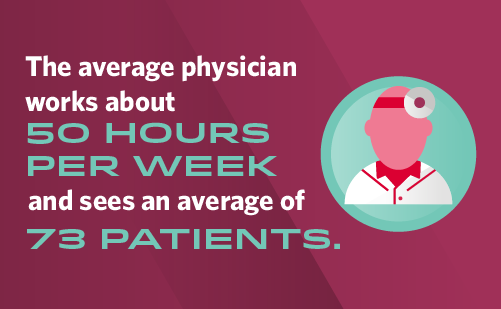
This consistency may be encouraging on the surface, but it also reflects ongoing constraints. Many doctors are maxed out on time and still finding themselves spread thin across patient care, documentation, and administrative duties.
Dump the long hours: How to improve job satisfaction
Lower-paid specialties show increased earnings
While the top-earning specialties tend to hold steady, some lower-compensated specialties saw the biggest year-over-year gains in 2024.
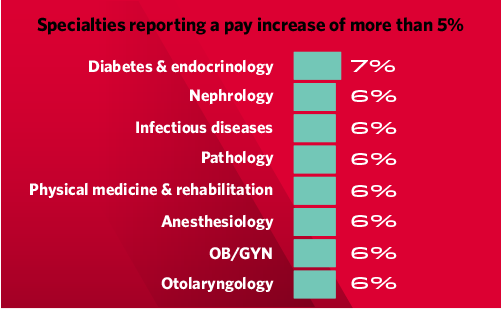
The specialty seeing the biggest increase was diabetes and endocrinology, up 7% from last year’s average salary. Additionally, the following specialties increased by 6%:
Infectious diseases
Nephrology
Pathology
Physical medicine and rehabilitation
Anesthesiology
OB-GYN
Otolaryngology
These increases offer some positive momentum for specialties that have historically lagged in pay, even as they take on critical roles in public health, chronic disease management, and acute care.
Gender pay gap widens again
Unfortunately, the gender pay gap among physicians has not only persisted, but it has also widened for the third year in a row.
In 2024, male physicians earned an average of $414,000, almost $100,000 more than female physicians, who earned an average of $318,000.
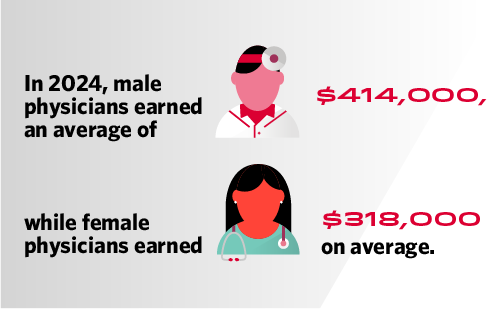
That’s a 23% gap, up from 22% in 2023 and 20% in 2022. The gap varies by specialty:
Among PCPs, male doctors earned $307,000, while female doctors earned $268,000.
Among specialists, men earned $447,000, compared to $339,000 for women.
The reasons are complex and likely include factors such as practice ownership, subspecialty selection, part-time status, and systemic bias. Regardless, the growing disparity is discouraging and signals that progress on pay equity remains a work in progress.
Nearly 40% of physicians are taking on side gigs
One of the most notable trends in this year’s report: nearly four in 10 physicians (38%) now take on additional work outside of their primary role.
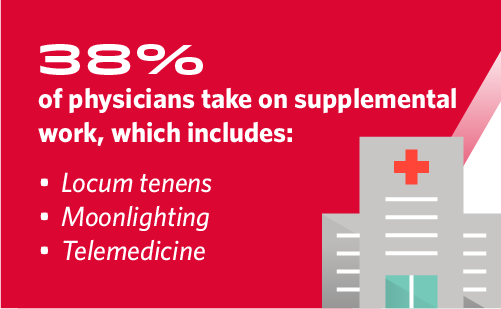
Most of this supplemental work remains in the medical field, including moonlighting, telemedicine, and locum tenens.
Psychiatrist Dr. Michelle Schofield, who works locum tenens telehealth jobs through Weatherby Healthcare, says she enjoys the extra income. "Weatherby pays every Friday—that was a huge selling point," she says. "My primary job pays monthly on the 15th, so weekly supplemental income is helpful."
The appeal is clear. Supplemental gigs offer a way to boost earnings, gain schedule flexibility, or explore new settings without a long-term commitment.
Where physicians are earning the most
Geography continues to significantly influence physician compensation. Doctors based in the Midwest region reported the highest average salaries, at $385,000, which is slightly more than the national average.
The next highest region was the South, where doctors earned an average of $375,000.
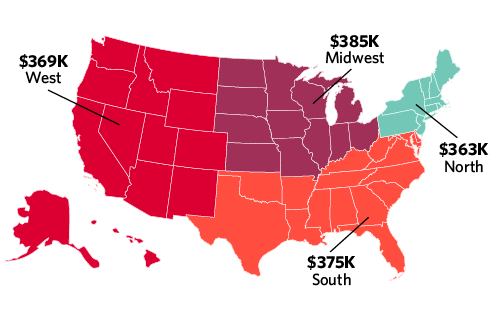
Lower physician density, rural demand, and competitive incentives all contribute to higher pay in these regions, making them attractive options for those open to relocating or working locum tenens assignments.
From Locumstory: Top 10 highest-paying states for locum tenens physicians in 2025
Physicians are feeling underpaid
Despite the steady income gains, physician satisfaction with pay is slipping. Only 48% of physicians said they feel fairly compensated in 2024, the lowest percentage in the last decade. That number is down from 59% in 2021 and continues a multi-year downward trend.
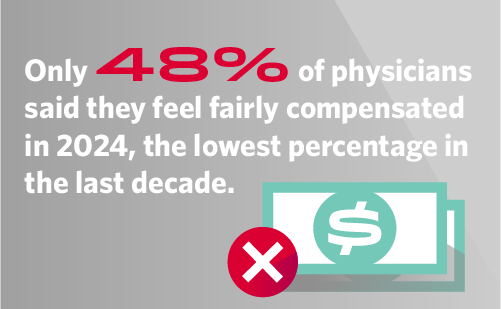
Digging deeper:
61% of physicians said they believe doctors overall are underpaid for the work they do.
Many cited burnout, increasing documentation, and rising overhead as key stressors.
Yet, 71% of respondents said their compensation at least covers their cost of living, debt, and retirement savings.
The takeaway: Most physicians are getting by, but many say they aren’t thriving financially or emotionally.
Looking ahead: Modest growth, persistent pressures
The 2025 Medscape Physician Compensation Report shows a profession in flux. While salaries are ticking upward, they’re not outpacing inflation or the growing expectations placed on physicians.
Workloads remain high. Satisfaction with compensation is falling. And many doctors are increasingly turning to alternative ways to earn, especially through locum tenens work.
How can I earn more as a physician?
For physicians looking to increase their income, locum tenens work offers a flexible alternative. These short-term assignments allow doctors to earn competitive pay while setting their own schedules and choosing where and how often they work.
Whether you’re trying to pay down loans faster, save for retirement, or simply regain control over your work-life balance, locum tenens can be an excellent option. Assignments can range from a few days to several months and often include travel, housing, and malpractice coverage.
Physicians at every career stage, from new grads to those approaching retirement, are discovering how locum tenens can offer not only higher earnings but also a better quality of life.
Want to earn more and take control of your schedule? Locum tenens offers competitive pay, flexible assignments, and a chance to rediscover what you love about medicine. Give us a call at 888.714.2330 or view today’s locum tenens jobs to get started.
